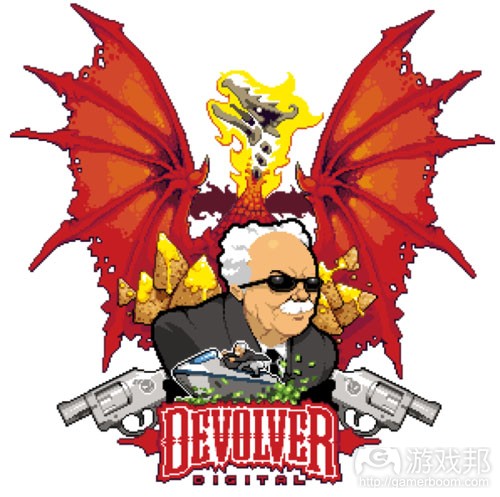Devolver Digital创始人分享独立发行游戏经历
作者:Kris Graft
在2007年GDC期间,我参加了一个行业派对。虽然我在派对上喝着啤酒,观看着表演,但是内心却想着自己的业务。便是在那时候我注意到了一个披着斗篷,并带着公鸡面具的人,也就是Mike Wilson。这是我与他的第一次见面。
这便是Wilson的魅力。那时候他正努力向人们介绍Gamecock——在2009年独自创造了一款小型游戏但却遭遇了失败的发行商。在此之前,他与别人联合创建了Gathering of Developers,即另一家把独立开发商们当成业务策略核心的公司。Take-Two收购了这家公司,后来又关闭了它。
在Gamecock于2009年倒闭后,Wilson又投资创建了Devolver Digital。再一次地,他又瞄准了发行独立开发游戏的业务。这是Wilson一直以来所坚持的主题(与长期合作伙伴Harry Miller一起):对独立游戏及其发行业务充满兴趣。
在巴士上推广游戏
在去年的GDC上,Devoler宣称他们将启动一辆巴士绕着活动场地行驶,让所有独立游戏开发商们都可以在此推广自己创造的游戏。在3月25日至29日的旧金山GDC上,他们再次开展了以独立开发商们为核心的活动,即以“向Fork Parker推广游戏”为主题(游戏邦注:“Fork Parker”是该公司虚构的首席财务官)。但这次的活动只是待在展览中心内,而未使用巴士。
Wilson说道:“考虑到去年有人晕车,所以才未继续使用巴士。”
让开发商们能在巴士上宣传自己的游戏真的是一个很棒的创想。并且这也能帮助Devoler与各家独立游戏开发商建立起紧密的关系。
Devoler在与Chris Pavia和Cube Roots在进行巴士会议后便签下了他们的游戏《Dungeon Hearts》——带有经典JRPG画面的卷轴三消益智游戏。在巴士的旅程中,许多独立开发商都听说了Devoler接受游戏推广活动。很快地,Vlambeer和Dennaton(视觉艺术家Dennis Wedin和独立开发者Jonatan Soderstrom)分别与该发行商签订了《Luftrausers》与《Hotline Miami》的合作协议。(顺便一提,Devolver刚刚宣布,本周将面向PlayStation 3和PS Vita发行《Hotline Miami》。)
虽然Devolver在2012年只发行了2款游戏,但是Wilson希望在今年能够发行10款游戏。
独立发行商
如此看来,即使发行数量增加了,Devolver在2013年也未能平均每个月发行一款游戏。对于Wilson来说,发行独立游戏的秘诀便在于努力成为独立游戏发行商。Devolver共拥有5名员工——4名在总部奥斯汀,1名在伦敦。因为费用并不多,所以该公司并不需要那种能够一夜爆红的游戏。Devolver最近发行的《Hotline Miami》便在PC上售出了30多万份,对于一款小型独立游戏来说这已经是非常惊人的成绩了。
Wilson解释道:“与我之前投资的其他公司不同,也是Devolver的特别之处便是,我们都拥有这家公司。Devolver的所有者们便是那些在为该公司效劳的员工们。我们都能控制公司,并见证所有交易。最初我们也拥有投资者,但是后来我们买回了这些股份。因为我们不希望重蹈Gamecock的覆辙。”
“我们也是独立的。我认为这是让那些愿意与我们合作的开发商们产生共鸣的最佳元素。”
Wilson总是能够有效地吸引别人的注意,从G.O.D和Gamecock便可以看出。但是Devolver却不同。就像Wilson所说的,这是一家完全独立的公司,由公司内部的员工们所控制。Wilson说他们将赚到的钱用于投资更多项目,而不是发工资,购买披肩或公鸡面具。Devolver完全是面向游戏和开发商们。说实话,从选择《Hotline Miami》和《Luftrauser》便能看出他们的好品味。
之所以拥有如此明确的方向是源于Wilson及其合作伙伴从过去几年的经历中吸取了各种经验教训,并更加清楚自己想要发行怎样类型的游戏。
他说道:“我们并不是在创造1000美元的游戏,这并不是我们所希望的。我们之前尝试过,但却发现这一点都不有趣。”
(本文为游戏邦/gamerboom.com编译,拒绝任何不保留版权的转载,如需转载请联系:游戏邦)
A game publisher that’s indie enough for indies
By Kris Graft
At GDC 2007, I was at an industry party having a beer, watching a whole lot of Burning Man performers doing all kinds of stuff, just minding my own business. That’s when Mike Wilson, wearing a cape and a rooster mask, tackled me to the floor. I’m fairly certain that was the first time I ever met him in person.
That’s the kind of…energy that Wilson (pictured) is known for. At the time, he was just getting people acquainted with Gamecock, the ill-fated publisher of small, independently-developed games that collapsed in 2009. Prior to that, he co-founded Gathering of Developers, another company that put independent developers at the center of its business strategy. Take-Two acquired it, and later shuttered it.
Shortly after Gamecock’s demise in 2009, Devolver Digital emerged as Wilson’s latest venture. Again, the business centers on publishing independently-developed games. That’s the ongoing theme for Wilson (and long-time business partner Harry Miller): a keen interest in independent games and the tricky publishing business surrounding them.
Pitching at GDC
Last year at the Game Developers Conference, in typical Wilson fashion, Devolver announced it would have a bus roaming around the premises, in which indie game developers would pitch their games as they puttered about. They’re taking indie pitches again at GDC in San Francisco from March 25-29 for another “Pitch Fork Parker” initiative (“Fork Parker” is the company’s fictional CFO). But they’ll just be at the Moscone Center –they’re skipping the bus this time.
“Some people got seasick on it last year,” Wilson told me over the phone. “Mostly our people, they were on it all day.”
Having a bus drive people around as they pitch games is a stunt dripping with gimmickry. But the partnerships forged from this indie reach-out speak to the credibility Devolver has among even the most fiercely Indie (with a capital “I”) game developers.
Devolver signed Chris Pavia and Cube Roots’ game Dungeon Hearts — a scrolling match-three-style game with a classic JRPG aesthetic — the same day of their bus meeting. Around the same time as the bus tour, other indies heard Devolver was accepting pitches. Soon after, Vlambeer and Dennaton (Dennis Wedin and Jonatan “Cactus” Soderstrom) signed deals with the publisher for Luftrausers and Hotline Miami, respectively. (Incidentally, Devolver just announced this week that Hotline Miami is coming to PlayStation 3 and PS Vita.)
And more games are coming. Devolver published just two games in 2012, while this year Wilson expects to publish 10.
Indie publisher
But even with that increase, that averages out to less than a game per month for 2013. For Wilson, the secret to being a publisher of indie games is to be an indie game publisher. Devolver has just five staff total — four at the Austin, TX headquarters and one in London. Overhead is minimal, so the company doesn’t need monster hits. That said, Devolver recently announced that Hotline Miami has sold over 300,000 units on PC, which is a stunning number for a tiny indie game.
“What’s cool about Devolver, as opposed to our other ventures, is that we actually own this one completely,” Wilson explains. “The only people who own Devolver are the guys working there. We’re truly in control and able to see through good deals for people. We had investors, then we bought it back. We don’t want what happened to Gamecock to ever happen again, when the rug was pulled out from under us.
“We are indie, too. I think that’s what resonates well with the developers we work with.”
Wilson is known for his showmanship, his ability to catch your attention. G.O.D. and Gamecock certainly showed that. Devolver seems different. As Wilson said, it’s wholly independent, owned by people who work there. Wilson says money that is made goes back into investing into more projects, not extravagant salaries or capes or rooster masks. Devolver seems to be completely about the games and the developers. And the fact they picked up Hotline Miami and Luftrauser shows me that they’ve got pretty good taste.
Maybe this apparent clarity of direction is because Wilson and his partners have learned something about themselves over the years, and better understand the kinds of games they want to publish.
“We’re not doing $10 million games, that’s not what we aspire to,” he says. “We’ve been there, and it’s just not as fun.” (source:gamasutra)
上一篇:8个机制分析《Puzzle & Dragons》的得失
下一篇:列举3种带有冥想功能的游戏类型








































 闽公网安备35020302001549号
闽公网安备35020302001549号